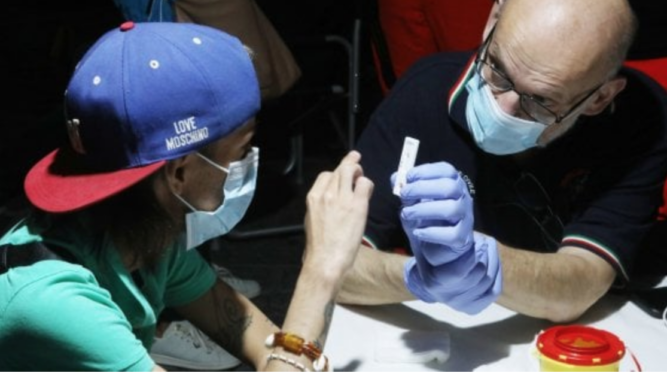Free Tuscan COVID Testing at Night

Piazza Santo Spirito in Florence welcomed a COVID-19 diagnosis and prevention campaign on July 25 promoting free serological testing available at nightlight places frequented by young people. Continuing throughout the summer, the initiative, called “Movida si cura” (Nightlife takes care of itself), will be replicated in Florence and in coastal towns throughout Tuscany including Viareggio, Follonica and Castiglione della Pescaia. The free testing services will take place every Friday and Saturday from 10 pm to 2 am in popular nightlife squares and locations, a list which continues to grow as more municipalities follow suit.
TESTING CALENDAR
August 1. 2020
CITIES & TOWNS
Piazza Santo Spirito, Florence
Borgo San Lorenzo
Pisa, Piazza delle Vettovaglie /Borgo Stretto Pistoia, La Sala
ON THE COAST
Lido di Camaiore, Piazza Matteotti, Forte dei Marmi, Lido
Viareggio, Piazza Mazzini Castiglioncello
Piombino
Orbetello
Porto Santo Stefano
August 7, 2020
CITIES & TOWNS
Piazza Santo Spirito, Florence
Pontedera, Golena
ON THE COAST
Marina di Massa Darsena (Viareggio) Torre del Lago Tirrenia
Livorno, Terrazza Mascagni
Follonica, Piazza Guerrazzi, Marina di Grosseto
Portoferraio (Elba)
August 8, 2020
CITIES & TOWNS
Piazzale Michelangelo, Florence
Pontedera, Golena
ON THE COAST
Marina di Massa Darsena (Viareggio) Torre del Lago Tirrenia
Livorno, Terrazza Mascagni
Follonica, Piazza Guerrazzi, Marina di Grosseto
Marina di Campo (Elba)
The regional health department began this anti-COVID drive to make serological tests more available to young people, who may request a test on a voluntary basis during the indicated times. Those who test positive for the virus must undergo a follow-up swab test and contact the toll-free regional number 800.556.060 to make an appointment with a physician. In addition to the COVID specific tests, people may also request alcohol tests.
Gazebos in the above areas will be set up so individuals may have free serological tests and access to all necessary resources. Masks and hand sanitizer gels will be made available to all those who need these essentials; volunteers and nursing staff from local health groups including the ANPAS Tuscan Public Assistance, the Misericordia, and the Red Cross will also be present. The only three rules the staff asks of individuals requesting a test are: wear a mask, wash your hands, and keep a safe distance from one another of at least one meter (3.2 ft.).
TYPES OF TESTS
The serological test, on the other hand, consists of a blood sample and aims to detect the presence or absence of antibodies to the virus. If the patient has actually developed antibodies, it would be an indication that the virus has passed through the body. It would act as an alarm light to know if you have been, or are still, infected.
The pharyngeal swab consists of a swab of the throat to determine if one is currently infected with COVID-19. It involves rubbing the swab against the internal walls of the throat. If the viral load is low, it may be necessary to repeat the examination more than once.
There are two types of antibodies detectable by this test: IgM which indicate that the infection is still in progress or IgG, which retain memory of the virus and indicate that it has been infected. After sampling, in the case of a positive response, the swab would next be carried out.
The first night of testing in Florence on July 25 brought 120 people to Piazza Santo Spirito in Oltrarno, all of whom voluntarily underwent the serological test and tested negative. Regional health councilor Stefania Saccardi also arrived in Piazza Santo Spirito, one of the most popular Florentine nightlife spots. Saccardi thanked the volunteers and staff who continue to be frontline workers once again. She went on to explain that the service came out of a mission to raise awareness about COVID prevention among a segment of the population who engage in nightlife. The councilor reminds us that precautions must continue and be taken seriously. President of Anpas Toscana Dimitri Bettini also spoke on the culture of prevention, which oftentimes manifests in less sincerity among the younger population. However, the negative tests provide comfort and remind us of the importance of testing, especially with the autumn ahead.
These heightened testing measures are in response to fear surrounding the implications of engaging in nightlife during COVID, and the possible return of the virus. Despite the decrease in cases and deaths, there remains a risk of an increase in contagion in Italy with its now open borders and big cities attracting heat and tourists during the summer months. Many groups of friends and families traveled to Tuscan cities to receive the free testing available in these nightlife locations, which only proves the point that testing must be made available to all — regardless of nighttime routine.
To see where to go for COVID-19 testing on a daily basis (for a fee of €50) click here.
To read more in Italian, visit Florence’s La Repubblica news site.
(elizabeth berry/additional reporting by rita kungel)
